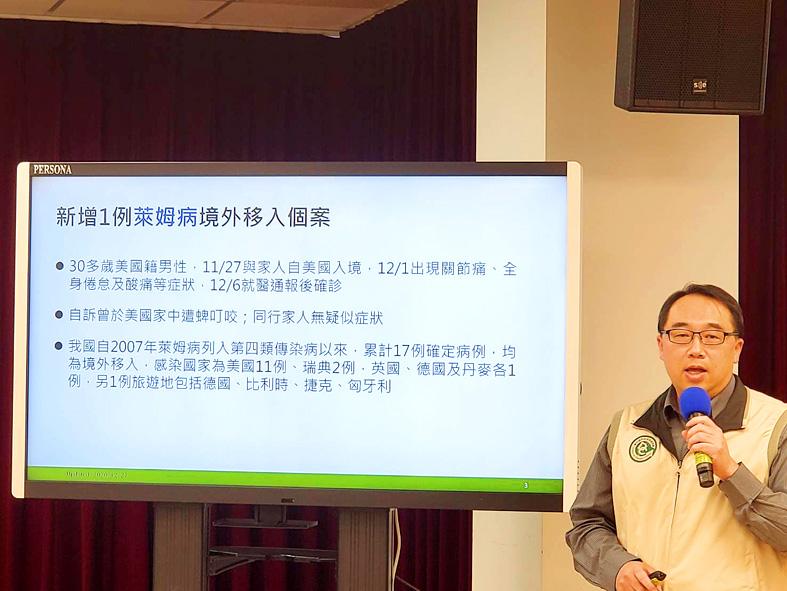The Centers for Disease Control (CDC) on Tuesday reported the first case of Lyme disease this year — an American man who traveled to Taiwan last month to visit his relatives.
The man, who is in his 30s, came to Taiwan with his family on Nov. 27 and stayed in a quarantine hotel after arrival, CDC Epidemic Intelligence Center Deputy Director Guo Hung-wei (郭宏偉) said.
However, as he developed joint pain, fatigue and muscle pain on Dec. 1, a local health department arranged for him to see a doctor and take a COVID-19 test on Dec. 6, Guo said.

Photo: Lin Hui-chin, Taipei Times
The man reported to the doctor that he had been bitten by a tick in the US.
He tested negative for COVID-19, but positive for Lyme disease, Guo said, adding that his symptoms have since been relieved, while his family did not show any symptoms.
Lyme disease is a bacterial infection that can be transmitted to humans by infected ticks that had bitten infected animals, but it cannot be transmitted through human-to-human contact, CDC physician Lin Yung-ching (林詠青) said.
The incubation period can range from three to 30 days, with an average of seven days, and about 70 to 80 percent of infected people develop erythema migrans — an expanding circular red rash around the bite, Lin said.
Other symptoms include a headache, fever, chills, nausea, vomiting and muscle pain, similar to a common cold, but if left untreated, the patient might develop heart or neurological problems, Lin said.
Ticks that transmit Lyme disease are mainly found in the temperate climate zone, such as in the US, especially in the northeast, Canada, Europe, Russia, South America, Japan, South Korea and China, he said.
There have been 17 imported cases of Lyme disease in Taiwan since the disease was designated as a category 4 notifiable communicable disease in 2007, he added.
People going outdoors in areas where the disease is spreading should wear light or bright-colored long sleeves and long pants, tuck in their shirts and pant legs, and apply insect repellent, he said.
They should use a tweezer to remove a tick if bitten and avoid twisting or jerking the insect to prevent parts of its mouth from breaking off and remaining in the skin, he added.

The first global hotel Keys Selection by the Michelin Guide includes four hotels in Taiwan, Michelin announced yesterday. All four received the “Michelin One Key,” indicating guests are to experience a “very special stay” at any of the locations as the establishments are “a true gem with personality. Service always goes the extra mile, and the hotel provides much more than others in its price range.” Of the four hotels, three are located in Taipei and one in Taichung. In Taipei, the One Key accolades were awarded to the Capella Taipei, Kimpton Da An Taipei and Mandarin Oriental Taipei. Capella Taipei was described by

The Taichung District Court yesterday confirmed its final ruling that the marriage between teenage heir Lai (賴) and a man surnamed Hsia (夏) was legally invalid, preventing Hsia from inheriting Lai’s NT$500 million (US$16.37 million) estate. The court confirmed that Hsia chose not to appeal the civil judgement after the court handed down its ruling in June, making the decision final. In the June ruling, the court said that Lai, 18, and Hsia, 26, showed “no mutual admiration before the marriage” and that their interactions were “distant and unfamiliar.” The judge concluded that the couple lacked the “true intention of

EVA Airways today confirmed the death of a flight attendant on Saturday upon their return to Taiwan and said an internal investigation has been launched, as criticism mounted over a social media post accusing the airline of failing to offer sufficient employee protections. According to the post, the flight attendant complained of feeling sick on board a flight, but was unable to take sick leave or access medical care. The crew member allegedly did not receive assistance from the chief purser, who failed to heed their requests for medical attention or call an ambulance once the flight landed, the post said. As sick

INDUSTRY: Beijing’s latest export measures go beyond targeting the US and would likely affect any country that uses Chinese rare earths or related tech, an academic said Taiwanese industries could face significant disruption from China’s newly tightened export controls on rare earth elements, as much of Taiwan’s supply indirectly depends on Chinese materials processed in Japan, a local expert said yesterday. Kristy Hsu (徐遵慈), director of the Taiwan ASEAN Studies Center at the Chung-Hua Institution for Economic Research, said that China’s latest export measures go far beyond targeting the US and would likely affect any country that uses Chinese rare earths or related technologies. With Japan and Southeast Asian countries among those expected to be hit, Taiwan could feel the impact through its reliance on Japanese-made semi-finished products and